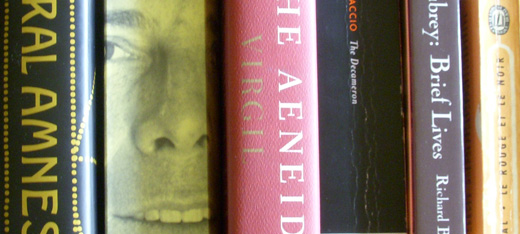Monday Morning Read
A friend wrote to me yesterday to say that she admired my discipline in getting through all of the Decameron, something that in fact had not happened before today. But discipline had nothing to do with it. Rather it was a case of giving myself permission to devote the latter part of three or four mornings a week to several pages of a few books each — in its way, the height of luxury. You cannot be spoiled by intellectual luxury so long as your appreciation of the pleasure is keen. The trick is not to press it, not to suffer diligence to decay into effort.
¶ How pleasant it is to discover that the tale of Patient Griselda does not carry a subtext of Patient Reader. Saucy Dioneo, bless him, tells the story with brisk dispatch. Griselda’s daughter is taken away, her son is taken away, and then she is sent away. As editor G M McWilliam points out in the notes, Decameron X, x can be read “rather as an elaborate parable on obedience to the Lord’s will rather than as a literal, realistic account of a husband’s sadistic cruelty.” Griselda’s habit of bowing to her fate with Scriptural quotations nails this interpretation, at least for me. There is certainly nothing sadistic or gloating about Boccaccio’s handling of Griselda’s ordeal — no unseemly lingering. The sheer homeliness of the tale, characterized by its heroine’s chaste reserve, brings us back to earth from the Tenth Day’s flights of princely largesse, allowing the mighty collection to close on home ground.
¶ In Aubrey, Shakespeare and Sidney, with Sidney getting twice the text. “… and these romancy plains and boscages did no doubt conduce to the heightening of Sir Philip Sidney’s fancy.” It is very droll to read “Mr William Shakespeare.” Aubrey’s assessment is astute:
His comedies will remain wit as long as the English tongue is understood, for that he handles the ways of men. Now our present writers reflect so much upon particular persons and coxcombities, that twenty years hence they will not be understood.
¶ From James Merrill’s “A Look Askance”:
                           See also at dusk
Meaning’s quick lineman climb from floor to floor
Inlaying gloom with beads of hot red oreThat hiss in the ferry’s backwash, already
Turning to steam where strobe-lit X trains quake
For the commuters of our dayTo night.
I’ve no idea what it means, but as my eye wandered over the poem in search of a hold, it kept finding one in these lines.
¶ In Cultural Amnesia, Egon Friedell: an Austrian Jew who threw himself out of a window right after the Anschluss, but who remained a spectral figure of the great cultural diaspora pressed by the Nazis. The piece is in three parts, about the café culture that came to an end in 1938; aphorism; and the blessed bad conscience that drove the last Soviet rulers to undo the apparatus of the Stalinist state. This is one of several pieces in Cultural Amnesia that one would be happy to see extended to book length.
Bad taste gives aesthetic expression to the aspirations of upstarts, and part of the appeal of Nazism was in the way it turned social mobility into a path of adventure rewarded with decorations at every step. The kind of women who could pin a diamond studded swastika to a bias-cut jersey silk evening dress were thrilled by the kind of men who had learned just enough about Wagner’s Siegmund to fancy the idea of impregnating Sieglinde. When the years of power were over, there was plenty to be nostalgic about.

